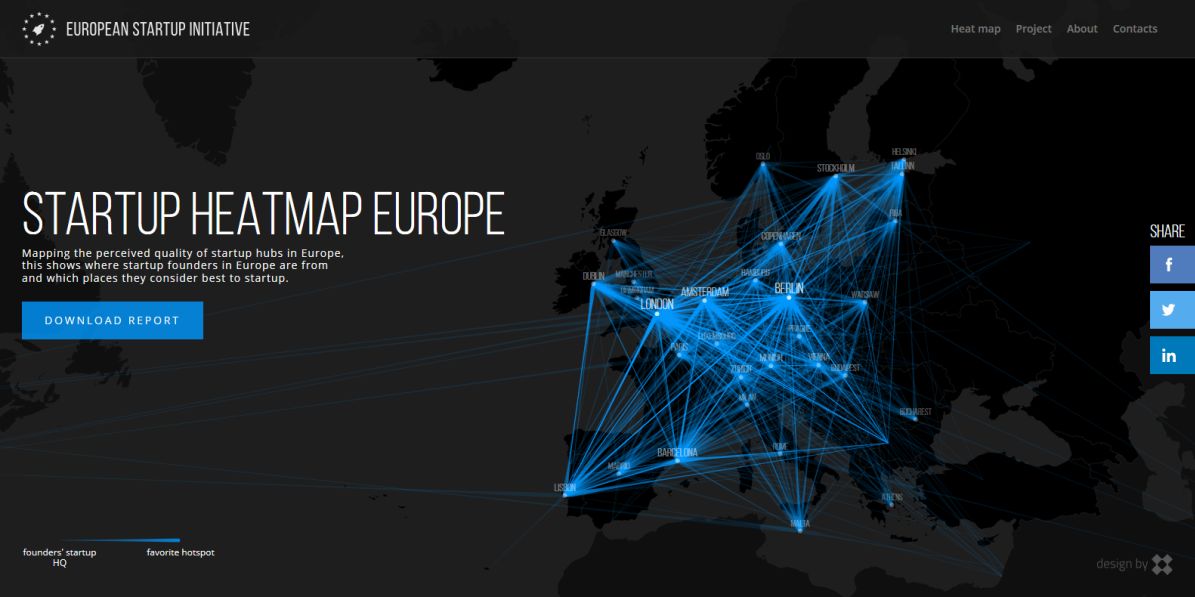
The European Startup Initiative analysed migration of start-ups in Europe and the perceived quality of European start-up hubs. The results revealed some surprises – even for Zurich.
One of the key questions of the survey was: “Where would you start up if you could begin all over again?” Start-up founders were able to choose five European start-up cities from a list of the 30 most prominent. To find the regional champions, the researchers grouped the survey participants according to their regions of origin and counted the total votes for each of the 30 start-up hubs.
The findings do not seem to support a ‘winner-takes-all’ dynamic, since strong contenders emerged in all regions. For northern Europeans, Stockholm, Tallinn, Riga, and Helsinki emerged as the top 10 cities, while in western Europe Munich, Hamburg, Vienna, Paris and Zurich climbed up the ranks. Entrepreneurs from western and southern Europe in particular voted for Zurich, whereas the city was more or less ignored by founders from the Nordic countries and eastern Europe.
Zurich as outstanding ecosystem for high-tech start-ups
Overall, Zurich ranks 11th in the ranking of the most attractive start-up European start-up hubs. However, this changes drastically if only votes by high-tech start-ups are considered, with Zurich jumping seven places, showing that it is perceived as an outstanding ecosystem for this field.
The report’s authors comment: “Our findings show that there is definitely room for specialisation and that smaller hubs can achieve a strong position on the start-up map. This becomes most evident when looking at the rankings of the high-tech and access to capital groups. The examples of Zurich and Munich as go-to locations for capital-intensive technology start-ups disprove the belief that the top choice is only Berlin or London. Rather, start-ups look for a match between their particular needs and the qualities of a location when considering moving.”
In addition, the European Startup Initiative tracked the movements of founders at a city, country and regional level. The numbers speak a clear language: while only about 4% of the general EU population moved to another country within the EU, an astonishing 23% of the survey participants founded their business in a country that is not their origin. Among this group, most had also left their home region (85%). In this case, ‘home region’ means a regional group of countries in Europe, such as the Baltics.
High-tech start-ups more likely to move than internet companies
Another question is whether the type of start-up makes a difference when it comes to a willingness to move. For this, the start-ups were categorised into two groups: high-tech start-ups that require more engineering (such as big data, hardware, IoT, health and biotech) and internet start-ups (e-commerce, mobile applications and SaaS solutions). When it comes to mobility between countries, 25.9% of high-tech start-up founders have moved compared to only 22.2% of internet start-up founders. The reason for the difference may be that internet-focused start-ups are able to work from anywhere and therefore decide to stay put. Some internet start-ups might also need to stay within their own ecosystem, as they are inclined to start up in markets they know well. High-tech companies, in contrast, are more inclined to move to a place where they find the best resources and talent. In the end, markets are less restricted for high-tech products, since they cater to specific B2B markets all over the world.
The results seem to confirm the general expectation that the strong economies in the north and west are able to attract foreign talent, while the southern and eastern regions have a negative migration balance. If Europe is divided into two according to GDP per capita, the economically stronger group of countries shows 8% growth, while the poorer half of Europe shrinks by 3%.
Start-ups looking for talent and a good ecosystem
When competing for entrepreneurial talent, one of the most important questions is why founders actually move. It turns out that access to talent and the quality of the ecosystem (access to support, partners and customers) are considered the most important factors for 71% and 69%, respectively, of the survey participants.
The survey can be downloaded for free on the website of the European Startup Initiative.























































Francis Pimenta @ 17.08.2016 18:16
i think when there are less surveys and study's we could invest that money in some more startups. :-) in my point of view we have a wonderful place for startups in switzerland. sadly the government doesn't know how to handle it ideal. when i see the last 25 years the ict market we only made one unicorn(mindmaze) in that time! and the internet was started in geneva. i hope we can overcome the current limitations and make switzerland a wonderful open startup place.
Please login or sign up to comment.
Commenting guidelines